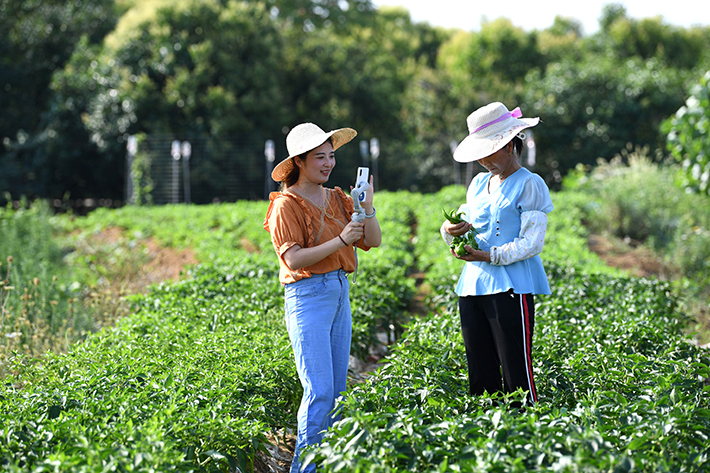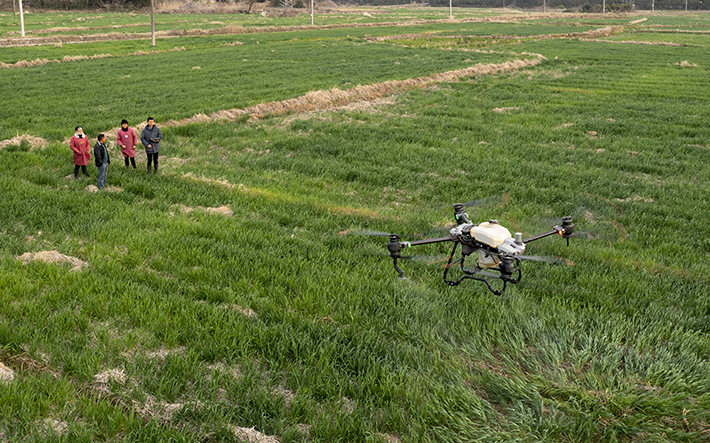|
||||||||||
| Home Nation World Business Opinion Lifestyle ChinAfrica Multimedia Columnists Documents Special Reports |
|
||||||||||
| Home Nation World Business Opinion Lifestyle ChinAfrica Multimedia Columnists Documents Special Reports |
| ChinAfrica |
| Driven by Dexterity |
| Vocational training plays a key role in rural revitalisation in China |
| Edited by Li Xiaoyu 丨VOL. 15 May 2023 ·2023-04-19 |

Hu Panpan (left), born in the 1990s, helps a farmer to sell agricultural products via livestreaming in Hefei, Anhui Province, on 30 June 2022. Hu runs a family farm after completing vocational training
Ying Chao, born in the 1990s in Jiaxing City of east China’s Zhejiang Province, is of the opinion that traditional agricultural methods cannot meet the demands of modern farming. He plans to change agricultural practices and follow the road of mechanisation after taking part in a one-year vocational training course on drones in Jiaxing Vocational and Technical College in 2021.
In fact, more and more young people like Ying are applying digital technology and big data to agricultural production and rural development. And the government has laid out plans to encourage this transition.
According to the White Paper on the Development of Vocational Education in China, which was released by the Ministry of Education in August 2022, more than 70 percent of students at vocational and technical schools come from rural regions. Therefore, it is advised that vocational education’s potential be fully utilised in order to nurture high-calibre farmers who are proficient in technology and modern management. This might give rural revitalisation a fresh boost, the white paper claims.
Generational shift
Ying feels proud to have been the first-ever drone pilot for plant protection in Jiaxing City. He is now general manager of Jiaxing Lukang Agricultural Development Co. He enumerated a number of uses for drones, including planting seeds, fertilising farms, managing plant diseases, and even feeding cattle.
Compared to manual labour, drones are significantly more cost-effective and efficient, he said. They make it possible to plant seeds more evenly, which enhances crop growth. These devices can also be used in the fields right after it rains and the soil is wet.
His company’s farm is completely mechanised and planted with high-quality seed after two years of arduous effort. The yield of the late rice on 19,000 mu (1,267 hectare) is 5,850 tonnes, making it a local high-yielding grain demonstration field. Last year, Ying was given the Young Pioneer Award for Rural Revitalisation of Jiaxing, and his farm was recognised as a provincial demonstration farm for youth innovation.
An increasing number of young farmers have joined his team, which includes eight people now, all of whom he describes as “multi-skilled pilots.” They are able to work on up to 3,000 mu (200 hectares) each day. In addition to encouraging his members to attend theoretical trainings organised annually by the local government, he is also keen to have them visit agricultural enterprises to raise their technical level through practice.
It reminds him of his own training. “I learnt a lot at school,” he said. Agricultural mechanisation was one of his favourite classes since it introduced him to numerous new machineries, such as mechanical rakes, balers, and transplanters, that he had never seen before. He gained a better understanding of the role that mechanisation plays in agricultural modernisation as a result of this experience.
Ying’s experience of vocational training inspired him to always try to learn new things. He is eager to increase his knowledge of contemporary agricultural mechanisation and learn how to use new agricultural equipment. Given the importance of technology in the development of mechanical agriculture, he has recently familiarised himself with digital technology. He said that in addition to his machines, intelligent devices that can monitor data and indications in the field enable more precise cultivation.

Zhang Bichao (right), manager of a local agricultural cooperative, operates a drone for spraying pesticides on a farm in Zhuji, Zhejiang Province, on 16 March. After completing vocational training, the man returned to his home region to develop farm mechanisation
An efficient leverage
Statistics from the Ministry of Education show that nearly every aspect of rural revitalisation is covered by the more than 1,300 specialties provided by China’s 11,300 vocational and technical education schools. Of these, 15 percent offer agricultural vocational training programmes, with more than 5,000 people in attendance each day on average. Graduates from these schools have already contributed significantly to rural development and the growth of the middle class. More than 8 million students from low-income households attended vocational training between 2013 and 2020. According to the white paper, vocational and technical education has proven to be the most efficient tool to stop the intergenerational transfer of poverty.
Jiaxing Vocational and Technical College that Ying attended is one example. Since 2008, the college has offered a diploma training programme for farmers. Over the years, it has formed a “Jiaxing model” in the training of new professional farmers, which combines the degree with entrepreneurship.
Its Drone Application specialty promotes the use of drone technology for agricultural plant protection. To this purpose, the school has invited specialists to provide a series of training courses in technical skills, such as the assembly, debugging, and operation of crop protection drones, in collaboration with prominent businesses in this sector, such as DJI and Hangzhou Qifei Intelligent Technology. At the same time, it has set up a training base dedicated to drone assembly and overhaul.
Another vocational education facility in Zhejiang, Taizhou Vocational College of Science and Technology, offers a number of agriculture-related programmes. Jiang Chengtong, one of its students studying aircraft manufacturing technology, was granted a drone pilot’s licence last year. He won two grand prizes in an aeronautical competition, competing against students from universities.
Now he gives lectures voluntarily at the Taizhou Drone Science Extension Base, while also setting up an aircraft competition and service club to disseminate knowledge. Like Ying, he intends to utilise his drone-operating skills to support rural development after graduation.
Ying is currently training a team to use radio-controlled mini drones to spread crop protection materials on his farm. He wants to boost the value of vocational and technical education and cultivate more specialised technicians.
|
||||||||||||
| About Us | Contact Us | Advertise with Us | Subscribe |
| Copyright Beijing Review All rights reserved 京ICP备08005356号-5 京公网安备110102005860号 |